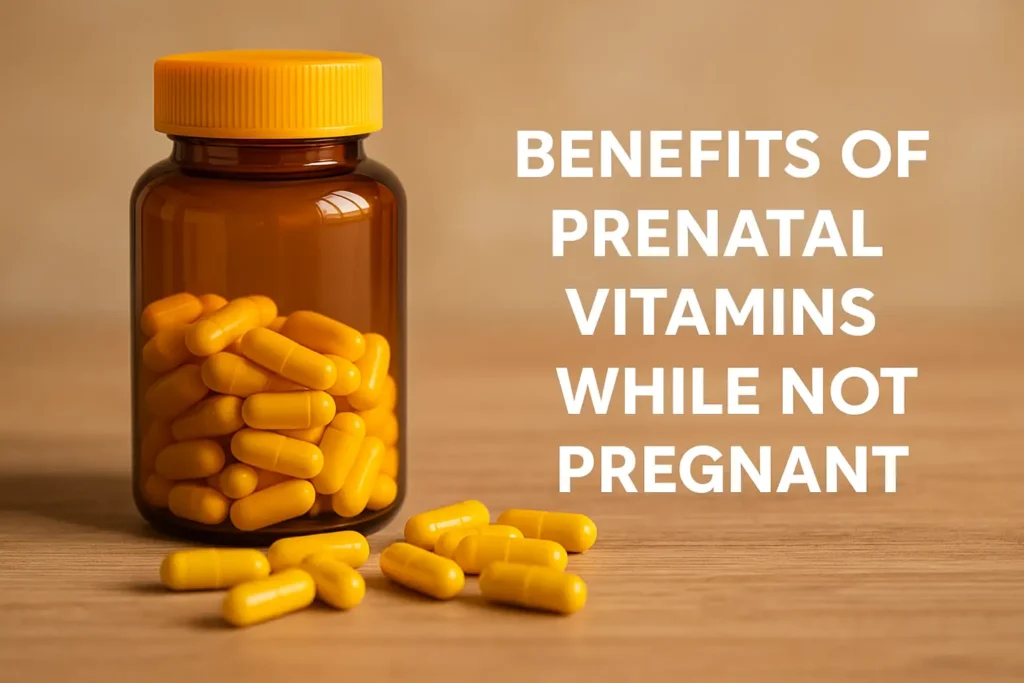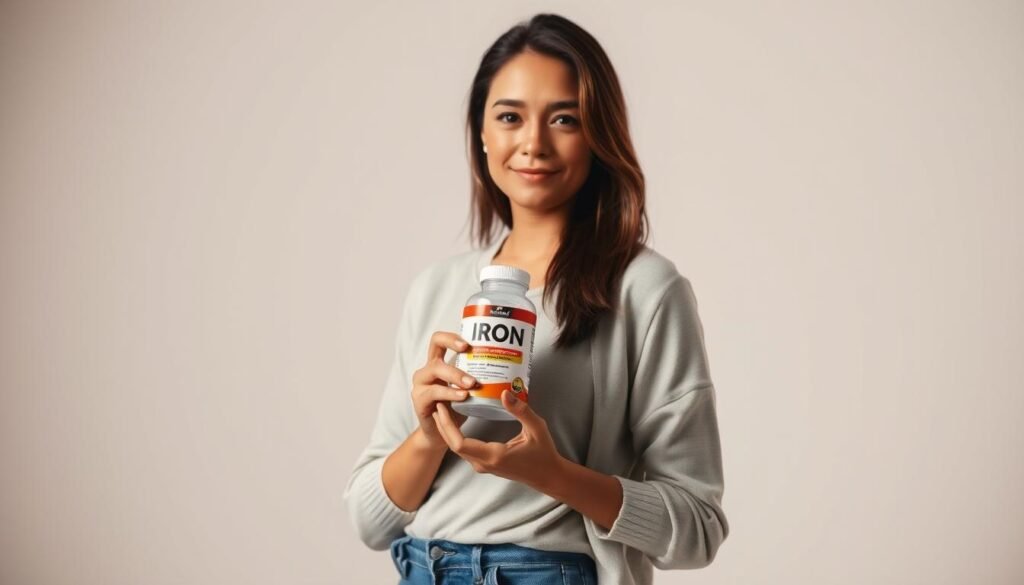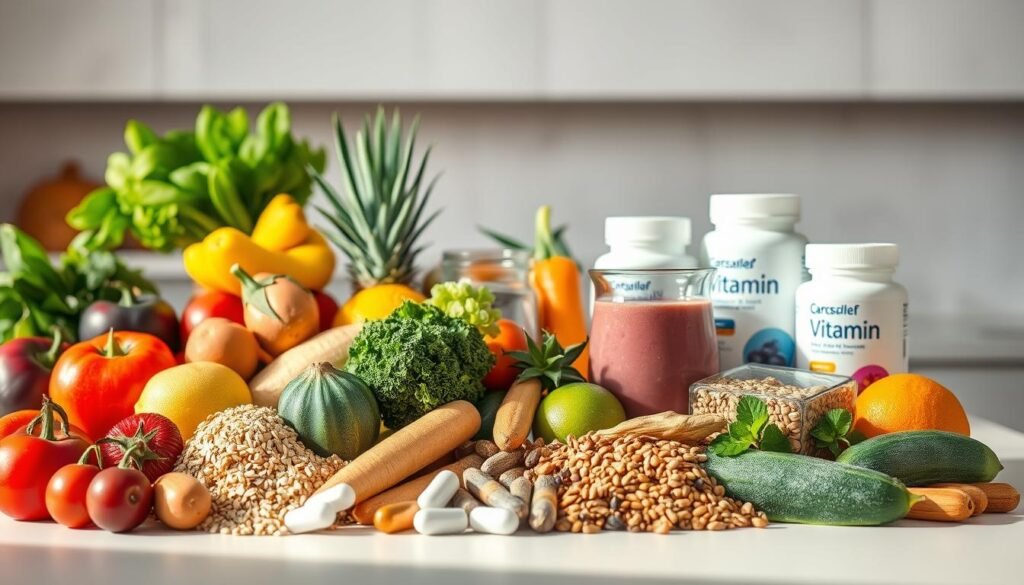You might have heard that prenatal vitamins are good for more than just pregnant women. Many people take them for thicker hair and stronger nails. But are these claims really true when it comes to the benefits of prenatal vitamins while not pregnant?
Katherine Zeratsky, R.D., L.D., says you don’t need prenatal vitamins if you’re not pregnant. However, some people still take them for extra folic acid, iron, and calcium — nutrients that are important for overall health.
Thinking about adding prenatal vitamins to your routine? It’s key to understand the benefits of prenatal vitamins while not pregnant and how they might affect you. Let’s explore their uses, advantages, and possible risks when you’re not expecting.

What Are Prenatal Vitamins?
Prenatal vitamins are special for pregnant women. They have more nutrients than regular multivitamins. These vitamins help keep the mom and baby healthy.
Key Nutrients in Prenatal Vitamins
Prenatal vitamins have important nutrients for a healthy pregnancy. Some key ones are:
- Folic Acid: It helps prevent birth defects of the brain and spine.
- Iron: It helps make red blood cells and prevent anemia.
- Calcium: It’s vital for the baby’s bones, teeth, and muscles.
- Vitamin D: It’s good for bone health and the immune system.
How Prenatal Vitamins Differ from Regular Multivitamins
Regular multivitamins fill general nutritional gaps. But prenatal vitamins are made for pregnancy. They have different nutrients.
Prenatal vitamins have more folic acid and iron than regular multivitamins. This is because pregnant women need more of these.
Knowing these differences helps you choose the right supplements. This is true whether you’re pregnant or not.
Benefits of Prenatal Vitamins While Not Pregnant
Prenatal vitamins do more than just support pregnant women. They help with women’s health in general. These supplements give key nutrients important for women, even if they’re not planning to have a baby.
Nutritional Support for Women of Reproductive Age
Prenatal vitamins give nutritional support to women of childbearing age. They have vitamins and minerals that help fill diet gaps.
Key nutrients in prenatal vitamins include:
- Folic acid
- Iron
- Calcium
- Vitamin D
- Omega-3 fatty acids
These nutrients are key for health. They’re great for women with dietary needs or busy lives.
Preparation for Unplanned Pregnancies
Unplanned pregnancies can happen. Being ready is important. Prenatal vitamins help a woman’s body get the nutrients it needs for a healthy pregnancy.
Folic acid in prenatal vitamins helps prevent birth defects of the brain and spine.
Supporting Overall Women’s Health
Prenatal vitamins also support overall women’s health. They help with hair, skin, and nail health. Nutrients like biotin and vitamin B help hair grow and nails get stronger.
A comparison of the benefits of prenatal vitamins for different aspects of women’s health is shown in the table below:
| Aspect of Health | Benefit | Key Nutrient |
|---|---|---|
| Hair Health | Promotes growth and strength | Biotin, Vitamin B |
| Skin Health | Supports overall skin health | Vitamin C, Vitamin E |
| Nail Health | Strengthens nails | Biotin, Calcium |
Folic Acid: A Key Component with Benefits Beyond Pregnancy
Folic acid is not just for pregnant women. It’s good for everyone’s health. It helps with DNA, cell growth, and division.
How Folic Acid Supports Overall Health
Folic acid is key for health. It makes red blood cells and prevents anemia. It also helps the heart by lowering bad blood levels.
It’s good for your mind too. It might help with depression and anxiety. It also helps keep your brain sharp as you age.
Recommended Daily Intake for Non-Pregnant Women
How much folic acid you need depends on your age and health. Non-pregnant women should get 400 micrograms (mcg) daily. Some might need more, like those with folate deficiency.
But too much folic acid can hide a vitamin B12 problem. This can harm your brain. Always talk to a doctor before taking folic acid supplements.
Iron Benefits for Non-Pregnant Women
Iron is key in prenatal vitamins, giving many health benefits to women. It’s not just for pregnant women. It helps all women of childbearing age stay healthy and feel good.

Addressing Iron Deficiency and Anemia
Iron in prenatal vitamins helps fight iron deficiency and anemia. Many women, due to heavy periods, lack enough iron. Prenatal vitamins with more iron can help.
Iron helps prevent anemia, which causes tiredness, weakness, and pale skin. It’s a big plus for women’s health.
Key benefits of iron supplementation include:
- Reducing the risk of iron deficiency anemia
- Improving overall energy levels
- Supporting cognitive function and concentration
Energy Levels and Cognitive Function
Iron helps carry oxygen to cells, boosting energy and brain power. For women not pregnant, iron keeps them from feeling tired. It also helps them stay sharp and focused.
Women can get these benefits by taking prenatal vitamins with enough iron. But, always talk to a doctor before starting any supplement. It’s important to make sure it’s right for you.
Calcium and Vitamin D: Building Strong Bones
Keeping your bones strong is key as you get older. Calcium and vitamin D are very important for this. They help your bones stay healthy as you go through life’s changes.
Bone Health Throughout Adulthood
Your bones’ health depends on your genes, lifestyle, and what you eat. Calcium is key for bones, and vitamin D helps your body use calcium. They work together to keep your bones strong, preventing osteoporosis and breaks.
As you get older, it’s harder to keep your bones dense. Hormonal shifts and less exercise can play a part. Eating enough calcium and vitamin D, or taking supplements, can help.
Preventing Deficiencies in Women
Women face a higher risk of losing bone density, mainly during menopause. Prenatal vitamins with calcium and vitamin D can help. They prevent deficiencies that could lead to serious problems.
Calcium and vitamin D are good for more than just bones. They’re key for your overall health. Knowing what you eat and when to take supplements is important, mainly if your diet lacks these nutrients.
Learning about calcium and vitamin D helps you protect your bones. You can make dietary changes or take supplements. Getting enough of these nutrients is vital for your health.
Beauty Benefits: Prenatal Vitamins for Hair, Skin, and Nails
Prenatal vitamins do more than just support pregnancy. They also help with hair, skin, and nail health. This makes them popular among women seeking beauty from within.

Biotin and Other B Vitamins for Hair Growth
Prenatal vitamins have lots of biotin and B vitamins. These are key for hair growth. Biotin makes hair follicles strong, leading to thicker hair. Niacin and folate help by improving scalp health and reducing dandruff.
Studies show B vitamins can stop hair loss and make hair look better. For women with thinning hair, prenatal vitamins are a great help.
Nutrients That Support Skin Health
Prenatal vitamins also boost skin health. Vitamin C is vital for collagen, keeping skin elastic and smooth. The antioxidants in these vitamins protect skin from harm and make it look healthier.
| Nutrient | Benefit to Skin Health |
|---|---|
| Vitamin C | Boosts collagen production, enhances skin elasticity |
| Antioxidants | Protects skin from environmental damage |
| Folic Acid | Helps in maintaining skin’s natural glow |
Strengthening Nails with Prenatal Supplements
Prenatal vitamins also make nails stronger. Biotin is key here, making nails less brittle. Vitamin E and iron also help by improving nail texture and preventing breakage.
Women with weak or brittle nails may see big improvements by taking prenatal vitamins daily.
Omega-3 Fatty Acids and DHA: Brain and Heart Health
Eating foods rich in omega-3 fatty acids can greatly improve your brain and heart health. Omega-3s, like DHA, are key for your brain and heart. They help keep your mind sharp and your heart healthy.
Cognitive Benefits of DHA
DHA is very important for your brain. It helps with thinking and learning. It also helps keep your brain healthy as you get older.
Key cognitive benefits of DHA include:
- Supporting brain health and development
- Aiding in maintaining cognitive function
- Potentially supporting memory
Cardiovascular Support from Omega-3s
Omega-3s, including DHA, are good for your heart. They might lower inflammation and keep your blood fats healthy. This is great for your heart and can lower heart disease risk.
| Omega-3 Benefits | Description |
|---|---|
| Heart Health | Supports cardiovascular well-being by potentially reducing inflammation |
| Cognitive Support | Aids in maintaining cognitive function and potentially supports memory |
Knowing how omega-3s and DHA help your health can guide your choices. You can add these important nutrients to your daily life.
Potential Side Effects and Risks
It’s important to know the side effects and risks of prenatal vitamins, even for women not pregnant. These supplements can help your health but can also cause problems. This is true if you take too much or don’t need it.

Gastrointestinal Issues
Prenatal vitamins can cause stomach problems. You might feel nausea, constipation, or diarrhea. The iron in these vitamins often causes these issues.
If you have ongoing stomach problems, talk to your doctor. They can help you figure out what to do or change your supplements.
Risks of Vitamin and Mineral Overconsumption
Prenatal vitamins have more nutrients than regular multivitamins. Taking them without needing to can lead to too much of some vitamins. For example, too much iron can harm your liver and heart.
Too much calcium can cause hypercalcemia. This can lead to kidney stones, bone pain, and weak muscles.
When Prenatal Vitamins May Not Be Appropriate
Some women should not take prenatal vitamins, even if they’re not pregnant. People with hemochromatosis should avoid them because of the iron. Women with a vitamin B12 deficiency might not get the right kind or amount of B12 from prenatal vitamins.
Long-Term Considerations
There’s not much research on the long-term effects of prenatal vitamins for non-pregnant women. But, taking them for a long time can cause problems. High doses of nutrients can lead to health issues.
So, it’s a good idea to check with your doctor about your supplements. They can help make sure you’re safe and healthy.
In short, prenatal vitamins can be good, but you need to know the risks. Talking to a healthcare provider can help you decide if they’re right for you.
Prenatal Vitamins vs. Regular Multivitamins for Non-Pregnant Women
It’s important to know the difference between prenatal vitamins and regular multivitamins. Both aim to give you essential nutrients. But they are made for different needs.
Prenatal vitamins are for pregnant women or those trying to get pregnant. They have more folic acid, iron, and calcium. Regular multivitamins are for everyone else and don’t have as much of these nutrients.
Comparing Nutrient Levels and Formulations
Prenatal vitamins and regular multivitamins differ in what they offer. Prenatal vitamins have more folic acid, iron, and calcium. This is because pregnant women need these nutrients more.
| Nutrient | Prenatal Vitamins | Regular Multivitamins |
|---|---|---|
| Folic Acid | 800-1000 mcg | 400-800 mcg |
| Iron | 27 mg | 18 mg |
| Calcium | 200-300 mg | 100-200 mg |
The table shows prenatal vitamins have more of these nutrients. This makes them better for pregnant women or those with special dietary needs.
Choosing the Right Supplement for Your Needs
Think about what you need before choosing a supplement. If you’re not pregnant but want to stay healthy, a regular multivitamin might work.
“The key to choosing the right supplement is understanding your nutritional needs and health objectives.”
If you’re planning to have a baby or your diet is lacking, a prenatal vitamin is better. Some women also like prenatal vitamins for their benefits on hair, skin, and nails.
Choosing between prenatal and regular multivitamins depends on your health needs and what you prefer. Talking to a healthcare professional can help you make the best choice.
Balanced Diet vs. Supplementation
Nutritional balance is key to health. Diet is most important, but supplements can help too. Knowing how diet and supplements work together is important for good nutrition.
A balanced diet gives your body what it needs. But, our busy lives and certain diets can leave gaps. Supplements help fill these gaps, making sure your body gets what it needs.
Food Sources of Key Nutrients
Many foods have important nutrients. For example, folic acid is in spinach, kale, and some cereals. Iron is in red meat, poultry, and lentils. Calcium and Vitamin D are in dairy and some plant milks.
- Folic acid: leafy greens, fortified cereals
- Iron: red meat, poultry, lentils
- Calcium and Vitamin D: dairy products, fortified plant-based milk
- Omega-3 fatty acids: fatty fish, flaxseeds, walnuts

When Supplements May Be Necessary
Even with a good diet, sometimes supplements are needed. For example, if you eat very little, are pregnant, or have a nutrient deficiency, supplements can help.
- If you eat mostly plants, you might need Vitamin B12 and iron supplements.
- Pregnant women often need more folic acid and iron.
- Older adults might need calcium and Vitamin D for bones.
Always talk to a doctor before taking supplements. They can help you choose the best ones for your health.
How to Select Quality Prenatal Supplements
Prenatal supplements vary a lot in quality. It’s key to know what to look for. Choosing a prenatal vitamin is more than picking a supplement. It’s about picking a product that could greatly affect your health or pregnancy.
Third-Party Testing and Certification
Looking for products with third-party testing is a reliable way to check quality. This means independent groups test the supplement to check its contents and purity. Certifications from groups like NSF International, ConsumerLab.com, or the National Science Foundation show the product is safe and contains what it says.
Third-party testing is key because it gives an unbiased look at the supplement’s quality. Manufacturers can say what they want, but without outside checks, it’s hard to trust them. Choosing a certified product means you can trust its quality and safety more.
Understanding Supplement Labels
It’s important to understand what’s on a prenatal supplement label. The label should list all ingredients and their amounts clearly. Look for a label that shows exactly how much of each nutrient is in the supplement. Be careful of proprietary blends that don’t show how much of each ingredient is in them.
The FDA does regulate dietary supplements, but not like it does for medicines. The FDA makes sure supplements are safe and labeled right, but it doesn’t test them before they hit the market. So, it’s up to you to be smart about what you buy. Check if the maker follows Good Manufacturing Practices (GMPs) and look for certifications to ensure quality.
When you read the label, think about how well your body can use the nutrients. Some vitamins and minerals are easier for your body to absorb than others. For example, folate is better than folic acid. Knowing this can help you pick a supplement that works best for you.
Conclusion
You now know the good things about taking prenatal vitamins even when you’re not pregnant. They help keep your body healthy and ready for pregnancy. Important nutrients like folic acid, iron, and calcium are key. They help with energy and keeping your bones strong.
When you’re thinking about taking supplements, talk to a healthcare provider first. They can figure out what you need. This way, you get the right supplement for your health goals.
Knowing what you need and picking a good prenatal vitamin is smart. Always check with a healthcare provider before starting any new supplements. This ensures you’re choosing what’s best for you.
FAQs
What are the benefits of taking prenatal vitamins when not pregnant?
Prenatal vitamins give you important nutrients like folic acid, iron, and calcium. They help your health, hair, skin, and nails. They also get your body ready for pregnancy.
Can I take prenatal vitamins if I’m not planning to get pregnant?
Yes, you can take prenatal vitamins even if you’re not planning to get pregnant. They help fill diet gaps and support your health.
What is the difference between prenatal vitamins and regular multivitamins?
Prenatal vitamins have more folic acid, iron, and calcium than regular multivitamins. This makes them better for women of childbearing age.
Are there any risks associated with taking prenatal vitamins when not pregnant?
Yes, taking prenatal vitamins when not pregnant can be risky. It can cause too much of certain nutrients. This might lead to stomach problems, imbalances, or other issues.
How much folic acid should I take daily if I’m not pregnant?
Non-pregnant women should take 400-800 mcg of folic acid daily. This supports your health and prevents deficiencies.
Can prenatal vitamins help with hair, skin, and nail health?
Yes, prenatal vitamins have biotin and B vitamins. They help grow hair, improve skin, and strengthen nails.
Are omega-3 fatty acids in prenatal vitamins beneficial for non-pregnant women?
Yes, omega-3 fatty acids, like DHA, in prenatal vitamins are good for your brain and heart. They also help with thinking and may fight inflammation.
How do I choose a high-quality prenatal vitamin supplement?
Look for prenatal vitamins that are third-party tested. They should be certified by NSF International or ConsumerLab.com. Make sure the label clearly shows each nutrient’s amount.
Can I get all the necessary nutrients from a balanced diet instead of taking prenatal vitamins?
A balanced diet gives you essential nutrients. But prenatal vitamins can fill gaps. They’re good for women with special diets, health issues, or planning pregnancy.
Should I consult a healthcare provider before taking prenatal vitamins when not pregnant?
Yes, talk to a healthcare provider before taking prenatal vitamins. This is important if you have health concerns or conditions. It ensures safe and effective use.
Can men take prenatal vitamins?
While prenatal vitamins are for women, men can benefit from some nutrients like omega-3s and folic acid. But, men should talk to a healthcare provider to find the right supplement for them.
What are the possible long-term effects of taking prenatal vitamins when not pregnant?
Long-term use of prenatal vitamins without pregnancy can be risky. It may lead to too much of certain nutrients. This could cause problems. Always talk to a healthcare provider about the risks and benefits.
Why do some people take prenatal vitamins even if they’re not pregnant?
Prenatal vitamins are rich in nutrients like folic acid, iron, and biotin. People take them to improve hair, nails, energy, and overall wellness—even without being pregnant.
Are there any advantages of prenatal pills when not pregnant?
Yes, prenatal pills offer higher doses of essential nutrients. They support immune health, energy levels, and beauty needs like skin glow and hair strength.
Is it bad to take prenatal vitamins when not pregnant?
It can be if taken long-term without need. Excessive intake of iron or vitamin A may cause side effects. Always check with your doctor before use.
What happens if you take prenatal vitamins but are not pregnant?
You might experience health benefits like better nutrient absorption, but there’s also a risk of over-supplementation if your body doesn’t need the extra nutrients.
Can taking prenatal vitamins improve fertility if you’re not pregnant?
Prenatal vitamins help prepare the body for pregnancy by supporting egg quality and hormone balance, but they aren’t a treatment for fertility issues.

